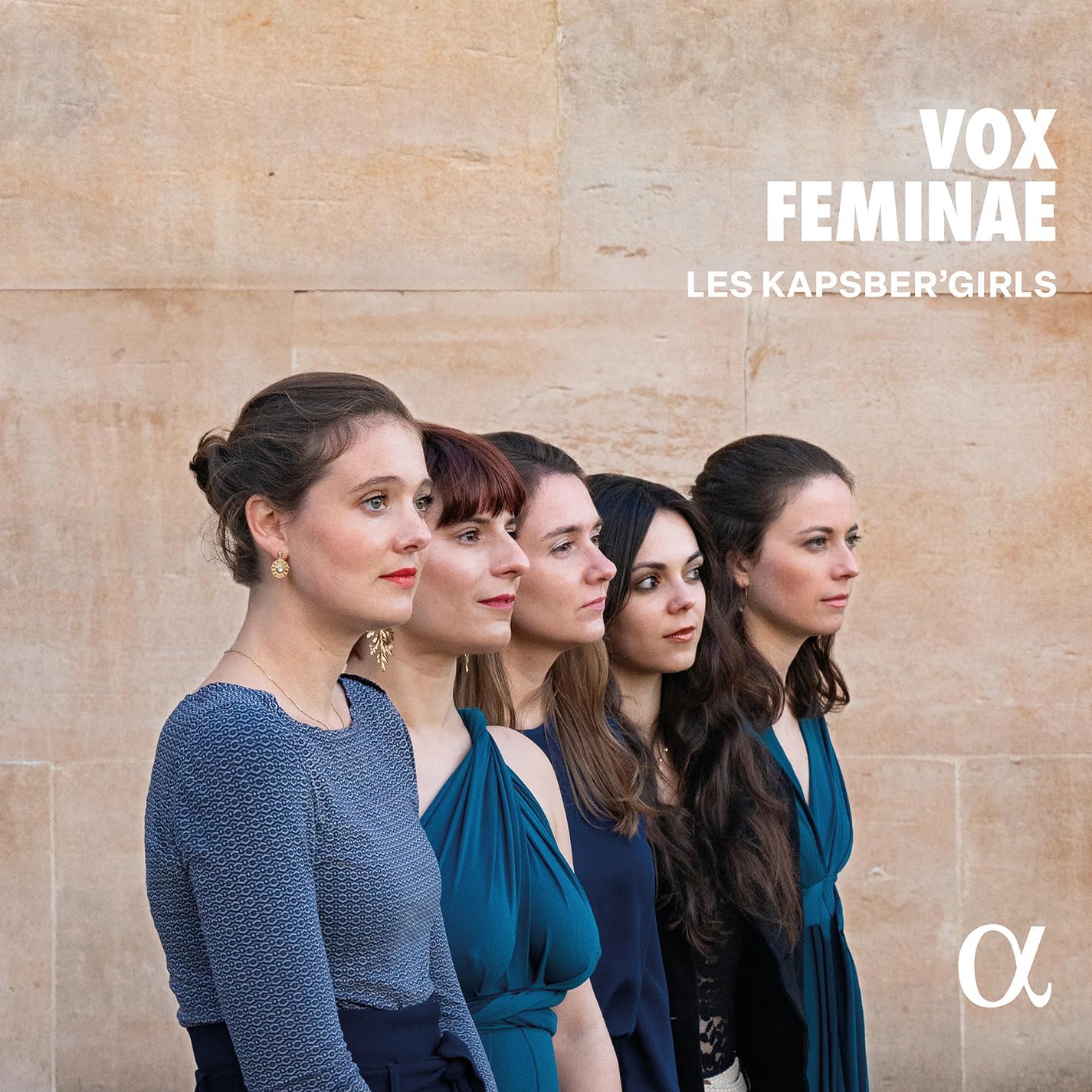 Vox Feminae: music by Barbara Strozzi, Antonia Bemba, Hieryonymus Kapsberger... Les Kapsber’girls/Albane Imbs (Alpha)
Vox Feminae: music by Barbara Strozzi, Antonia Bemba, Hieryonymus Kapsberger... Les Kapsber’girls/Albane Imbs (Alpha)
What a complete transformation from one album to the next. The last one, Vous-avez dit brunettes? – "did you say brunettes?" – (Alpha, 2021) opened tongue-in-cheek with the bleating and bells of a flock of sheep, then launching into occasionally over-theatrical songs about shepherds, love or drinking. Vox Feminae, a collection of works from Italian women composers, is in a different league altogether, and is surely going to end up winning some awards. Lutenist/ theorbo player Albane Imbs works as a continuo player in a host of leading European early music and baroque ensembles. Les Kapsber’girls is the group into which the Strasbourg-born musician puts her considerable energy and authority as leader, and for which she also works as a determined researcher scouting for new repertoire in libraries. Her playing throughout this disc – both as accompanist and in solo pieces by Kapsberger – has a rhythmic assertiveness and lively energy which are a complete joy.
The group was founded in 2015, and this is their third album. It was recorded at the studio of ECM artist Rolf Lislevand, and a mentor to the group, in rural Southern Norway, and shows what a strong concept and a group with ten years of experience can achieve at their impressive and highly integrated best. On the one hand, there are masterpieces which make the case for themselves: Imbs has justifiably talked of Barbara Strozzi’s “Che si può fare” in such terms, and the nine-minute version on this disc, with limpid soprano voice of and plaintive bass viol, is utterly irresistible. The group also find real ease of expression in the three works by Antonia Bembo (a composer whose improbable life story hasn’t yet – somewhat surprisingly – been made into a film or novel). Imbs has also set about unearthing works by other less-known female composers and found wonderful range of expressive possibilities. Lucia Quinciani’s tiny monody “Udite lagrimosi” is deeply affecting, and Francesca Caccini’s “Ch’amor sio nudo” has all the rhythmic springiness and lightness one could wish for. I can’t help thinking that Les Kapsber’girls might now have outlived their name. Vox Feminae is a strong and mature statement by a group of fine musicians whose experience as a group allows them to convey the strengths of this repertoire with total command. A very fine album indeed. Sebastian Scotney
 Malcolm Arnold: Organ Concerto, Concerto for Two Violins etc London Choral Sinfonia/Michael Waldron, James Orford (organ), Jack Liebeck & Alexander Sitkovetsky (violins) (Orchid Classics)
Malcolm Arnold: Organ Concerto, Concerto for Two Violins etc London Choral Sinfonia/Michael Waldron, James Orford (organ), Jack Liebeck & Alexander Sitkovetsky (violins) (Orchid Classics)
Gradually, Malcolm Arnold is being rehabilitated. As the people he personally upset depart the scene, and his sad and difficult life become more sympathetically viewed through the lens of mental illness, his music is re-emerging as worthy of recording and hearing. It is also freed from the institutional post-war orthodoxies that decried his unapologetically crowd-pleasing urges, and the tarnish of being “just” a film composer. The latest contribution to this renaissance is the London Choral Sinfonia’s excellent new miscellany: two concertos, a march, some sacred choral music and a cantata. Arnold was so fecund there is always more to discover, but I wasn’t previously really aware of his choral output, lots of which is getting its first recording here.
Malcolm's concertos are pleasingly bite-sized – no Romantic warhorses these. We open with the Organ Concerto, played by James Orford. Conductor Michael Waldron, in his liner notes, picks out the affinities with Poulenc’s concerto, which are definitely there, but Arnold’s is perhaps a tighter construction, and although its outer movements are in typical high spirits, the haunting slow movement is completely sincere, and completely lovely. The Concerto for Two Violins, written for Yehudi Menuhin in 1962, has the Bach double concerto as an obvious precursor. But it is rather darker, a personal memorial to Arnold’s two older brothers who had both died the previous year. There are elements of neo-Baroque figuration in the first movement, the two violins (Jack Liebeck and Alexander Sitkovestsky) intertwined and enmeshed. But as with the Organ Concerto the middle movement is the highlight, the sadness in the music palpable, played with committed intensity by soloists and ensemble.
As for the choral music, it is good, if not all touched with the spark of originality of the best Arnold. Pieces like the Op.55 Song of Praise, or the Laudate Dominum, sound a bit like Arnold the stylistic magpie “doing” Anglican church music. He does it perfectly well – and it is sung with energy and bravura – but I wasn’t as convinced as I was by the charming John Clare Cantata. Written for the unusual combination of SATB choir and piano duet the texts chart a year from one winter to the next through some lovely textures in the voices and – especially – the piano. The piece, as well as the performance, sounds very fresh. The rousing finale to the disc is Owain Park’s sparky new arrangement of Arnold’s signature march The Padstow Lifeboat, dating from his (relatively happy) time in Cornwall, played with gusto – especially the trumpets, switching between insistent Es, mimicking the local foghorn, and glittering virtuoso flourishes. Bernard Hughes
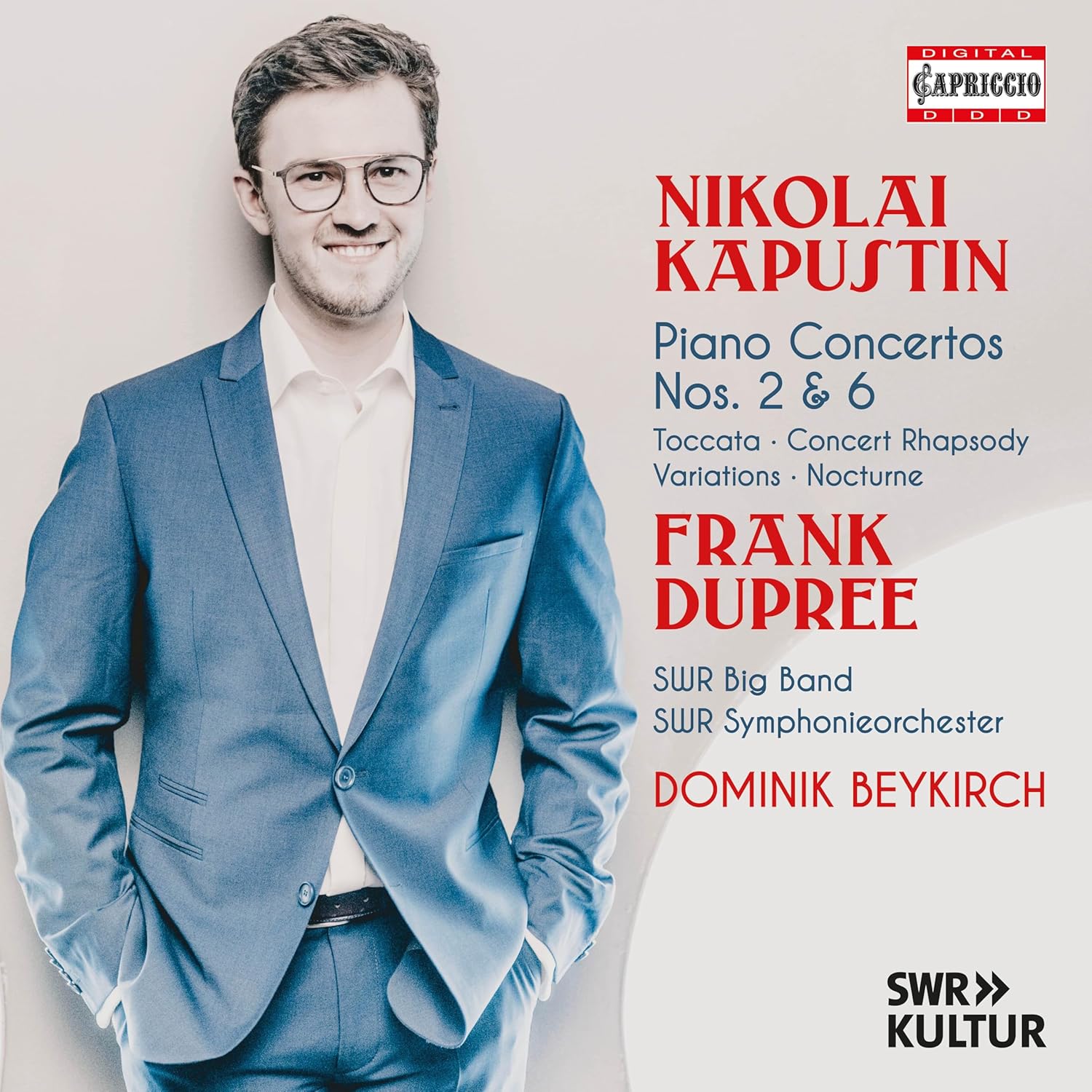 Nikolai Kapustin: Piano Concertos 2 and 6 etc Frank Dupree (piano), SWR Big Band, SWR Symphonieorchester/Dominik Beykirch (Cappricio)
Nikolai Kapustin: Piano Concertos 2 and 6 etc Frank Dupree (piano), SWR Big Band, SWR Symphonieorchester/Dominik Beykirch (Cappricio)
I’m a latecomer to the Nikolai Kapustin party, and after sampling this latest volume in German pianist Frank Dupree’s ongoing survey of the composer’s concertante works I’m eager to make up for lost time. Jens F Laurson’s excellent sleeve note offers a useful snapshot of a remarkable unsung composer, a musician “whose music sounded as spontaneous as an Oscar Peterson improvisation”, though with every note written out. Donetsk-born Kapustin (1937-2020) trained as a classical pianist but was drawn towards popular music. As a perfectionist, improvisation didn’t interest him – instead, writing everything in exacting detail allowed the composer to express himself as he saw fit. Laurson’s summary of Kapustin as someone who successfully bridged the gap between classical and jazz styles is about right, as his description of this music as “irresistibly fun.” Unsure? Sample the slow movement of the 1980 Piano Concerto No. 2, six minutes of lushly orchestrated lounge jazz which will brighten any grey day, and the ensuing “Rondo-Toccata” makes for a thrilling finale.
Three shorter pieces are included on this disc. 1972’s Nocturne for piano and orchestra is a bittersweet mood piece, while a tiny set of Variations and a Toccata for piano and wind band are virtuoso showpieces. Kapustin’s Piano Concerto No. 6 for piano and big band shows his style evolving, the language terser and drier. It’s still immensely appealing stuff, with a noirish central “Larghetto” and a motoric last movement not a million miles away from mid-period Bernstein (think Prelude, Fugue and Riffs). Dupree is a superb evangelist for this repertoire, and he’s brilliantly backed by SWR’s Big Band and Symphonieorchester under Dominik Beykirch, the recorded sound full of punch and colour. And it’s good that bassist Jakob Krupp and drummer Meinhard "Obi" Jenne get a shoutout in the credits, the latter’s taut, lively playing a constant across the whole album. This is a marvellous anthology containing some intoxicating music. Dive in – you won't regret it.
 Fresh Stone: Music by Piers Connor Kennedy The Choir of St Peter’s, Oxford/Quintin Beer, with Stanley Gordon (organ) (Acclaim Productions)
Fresh Stone: Music by Piers Connor Kennedy The Choir of St Peter’s, Oxford/Quintin Beer, with Stanley Gordon (organ) (Acclaim Productions)
St Peter’s is not one of the traditional choral big hitters in Oxford, but this recording shows the choir, under the leadership of Quintin Beer, can punch well above its weight. The young singers rise to the challenge of some difficult music on this rewarding journey through the output of Piers Connor Kennedy, a Welsh-Irish composer who has recently joined the King’s Singers as their new bass. He has a long pedigree as composer, writing extensively for college choirs, and is an alumnus and previous Associate Composer of St Peter’s. The choir – and Quintin Beer – are obviously fond of his music, and justifiably so.
Things open briskly with Epiphany, in which Kennedy sets out his compositional language: rhythmic, harmonically robust and music that sounds great to sing. This is certainly true of Song of Innocence, with its folky tune and handclaps, playful and entertaining, making a pointed contrast with its preceding Caligaverunt oculi mei. This is designed as a companion piece for a Bruckner motet and is dense and impassioned, spotlighting both high sopranos and low basses to good effect. Kennedy can achieve a pared-back simplicity, as in the E.E.Cummings setting little tree (but, people, please stop spelling Cummings’s name without capitals, it’s all just a misunderstanding that got out of hand) but though his version of the Coventry Carol starts simply it builds into something exquisitely piquant.
String Quartet II, an instrumental island amid all the singing, is short but not insubstantial. The middle movement is a plaintive hymn which opens out into a long-breathed melody for violin (Joseph Rudge) while the last movement is a wistful pizzicato web. The playing is excellent – the nameless quartet features three instrumentalists who also sing in the other items, which is very impressive. Although there is plenty of Anglican liturgical repertoire here, the Rumi setting This Marriage has a rich warmth and the final item, Bailey, is propelled by untuned percussion, with medieval intervals in the choir, in a piece commissioned to celebrate the opening of a new accommodation block at St Peter’s in 2024. The text, by Rob Yates, uses castle-imagery of strength, harbour and sanctuary, and Kennedy’s music offers a suitably muscular response and rounds off the album in high spirits. Bernard Hughes
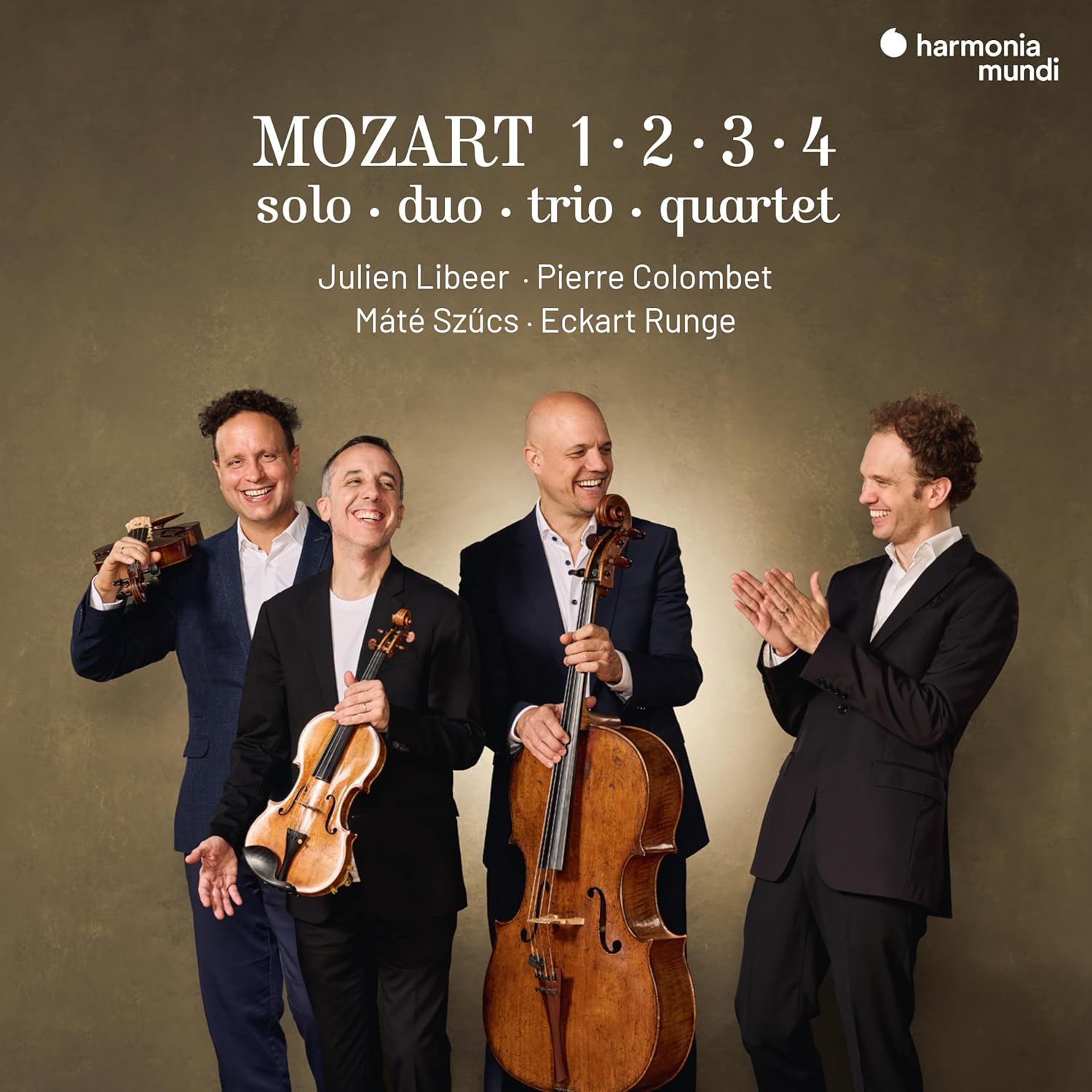 Mozart 1 ∙ 2 ∙ 3 ∙ 4 Solo, Duo, Trio, Quartet Julien Libeer (piano), Pierre Colombet (violin) Máté Szücs (viola) Eckart Runge (cello)(Harmonia Mundi)
Mozart 1 ∙ 2 ∙ 3 ∙ 4 Solo, Duo, Trio, Quartet Julien Libeer (piano), Pierre Colombet (violin) Máté Szücs (viola) Eckart Runge (cello)(Harmonia Mundi)
For me, the gem of this album, Belgian pianist Julien Libeer’s third for Harmonia Mundi, is the performance of Mozart’s F Major piano and violin sonata, K. 377 / 374e from 1781, which he has recorded in a duo with Pierre Colombet. Pierre who, you ask? Discogs tells me that this violinist hasn’t recorded anything since 2012. Strictly speaking that may be true, but there again it isn’t. Colombet is the first violinist in Quatuor Ébène, and has been ever since the group’s inception. He is a chamber musician of unbelievable class, with an ideal sense of shaping and phrasing...this is quite wonderful Mozart playing. I particularly enjoyed the central movement, a theme and six variations which runs for nearly ten minutes. Libeer and Colombet do what the great improvisers do, turning a new page and finding a fresh sound-world for each variation. They match each other for intensity throughout, and pace the music with real finesse. The recording is on the right scale too: it was made in the Sint Janskerk in Schiedam in Holland, rather than, say, in the much larger and more public space of the main hall of the Fondation Vuitton where the Ébènes recently made their recording of the Mozart quintets.
In his first two Harmonia Mundi albums, Libeer juxtaposed composers: Bach and Bartok in 2020, then Bach and a host of composers in 2022. For this new album he has stopped playing such games of "Only Connect". He explains that he has sought out musicians with a background in quartet playing who might, like him, feel drawn to find some gaps in their diaries and get together to play Mozart. This album consists first of a piano quartet, then a trio, then the duo, then a solo piano sonata. The album title and the sleeve note render that sequence, puzzlingly, in reverse order, but that’s a minor niggle.
More important is that the whole enterprise has such quality about it. Libeer’s mentor and champion at the Chapelle Musicale in Brussels was Maria João Pires, and if her shadow is there, I mean it as a sincere compliment. I still vividly remember the Chapelle’s 75th gala concert, where, as the star of the show, Pires played the Schubert F minor Fantasie with him, having just made her first entrance to turn pages for another one of her students. These are strong and durable connections: one of her fellow teachers there, cellist Eckart Runge, plays on this album. Libeer has taken the idea of chamber musicians of different ages and heritages gathering together and “giving the best of themselves” to Mozart’s music. The result is an album which hugely rewards repeated and careful listening. Sebastian Scotney
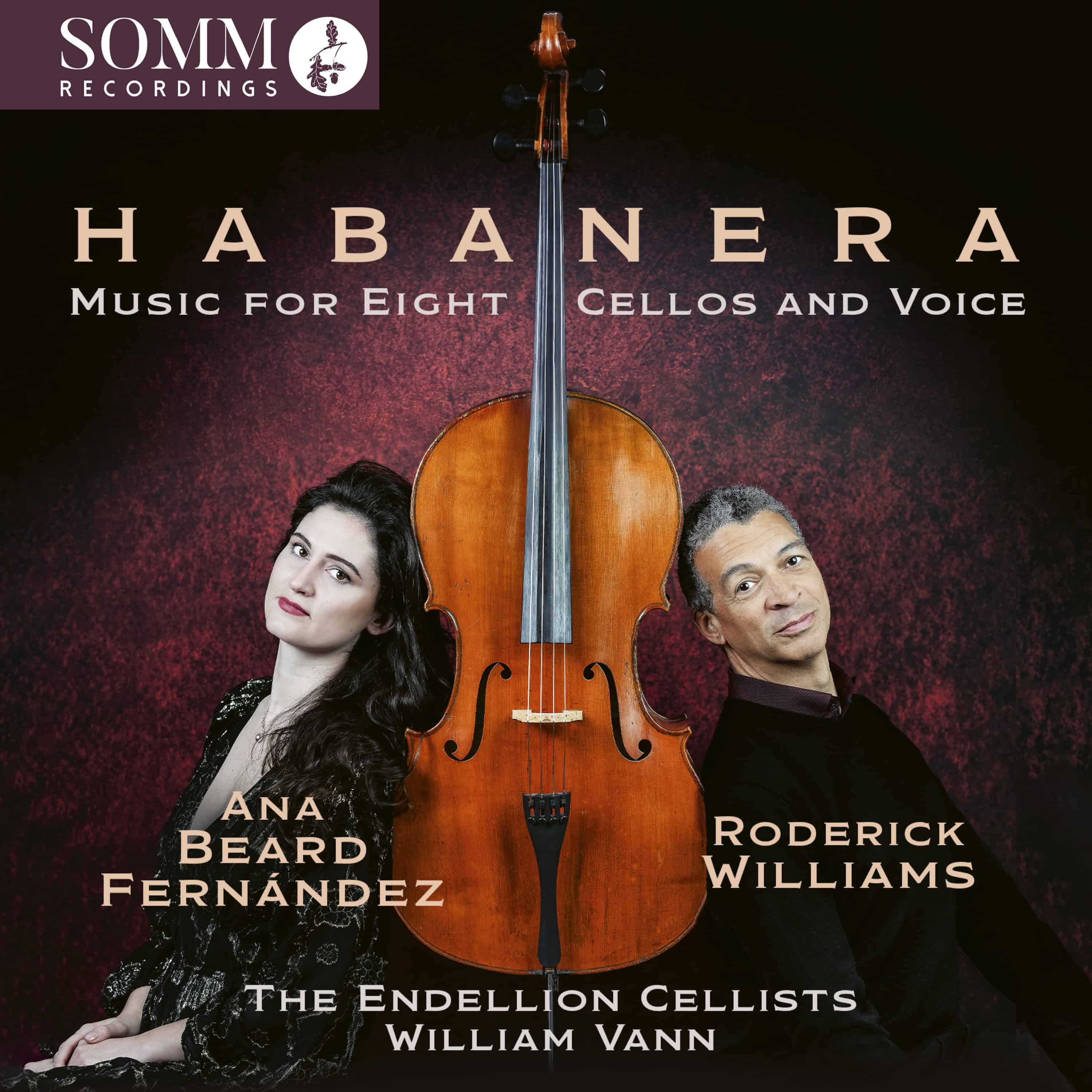 Habanera: Music for eight cellos and voice The Endellion Cellists/William Vann, with Ana Beard Fernández (soprano), Roderick Williams (baritone and cello), Iain Hall (recorder) (Somm Recordings)
Habanera: Music for eight cellos and voice The Endellion Cellists/William Vann, with Ana Beard Fernández (soprano), Roderick Williams (baritone and cello), Iain Hall (recorder) (Somm Recordings)
There’s probably just one work for eight cellos and voice which everyone knows. It’s on this entertaining album, the fifth of Villa-Lobos’s Bachianas Brasileiras making for a perfect opener. I got to know the work through Victoria de los Ángeles’s charismatic 1950s recording, the dry mono sound emphasising her voice over a murky backdrop. British-Spanish soprano Ana Beard Fernández’s performance of the famous “Ária” is blessed with much better engineering, the details in Villa-Lobos’s cello writing ideally clear. I like her “Dança” too, the cello rhythms nicely pointed. This recording was prompted by a performance at the 2023 Endellion Festival, where joint Artistic Director and lapsed string player Roderick Williams snuck in to play the eighth cello part. Its success prompted the pair to plan an album of mostly Spanish-themed music scored for similar forces, new arrangements supplied by Williams and Beard Fernández. Williams’ transcription of Falla’s Siete canciones populares españolas is a treat, Beard Fernández singing as if she’s making them up on the spot – sample the tiny “Canción”. It’s followed by a similarly effective version of Xavier Montsalvatge’s Cinco canciones negras, the cello accompaniment much more idiomatic sounding (to me at least) than the original piano version. Ravel’s Vocalise-étude en forme de habanera is another treat, the divisi cello writing perfectly realised.
Beard Fernández’s Tres canciones are scored for soprano and six cellists: Henri du Bailly’s “Yo soy la locura” is an earworm, and Xoán Montes haunting duet “Negra sombra” includes an evocative recorder obbligato supplied by Iain Hall, who also pops up in a winning version of “Forêts paisibles” from Rameau’s Les Indes galantes. I’d never heard Shostakovich’s beautiful “Proshchaj, Grenada!” before, and it’s wonderfully performed by Williams. Rachmaninov’s Vocalise feels like an interloper, though Beard Fernández sings it beautifully. No matter – this is an enticing collection, well-annotated with full texts and translations.
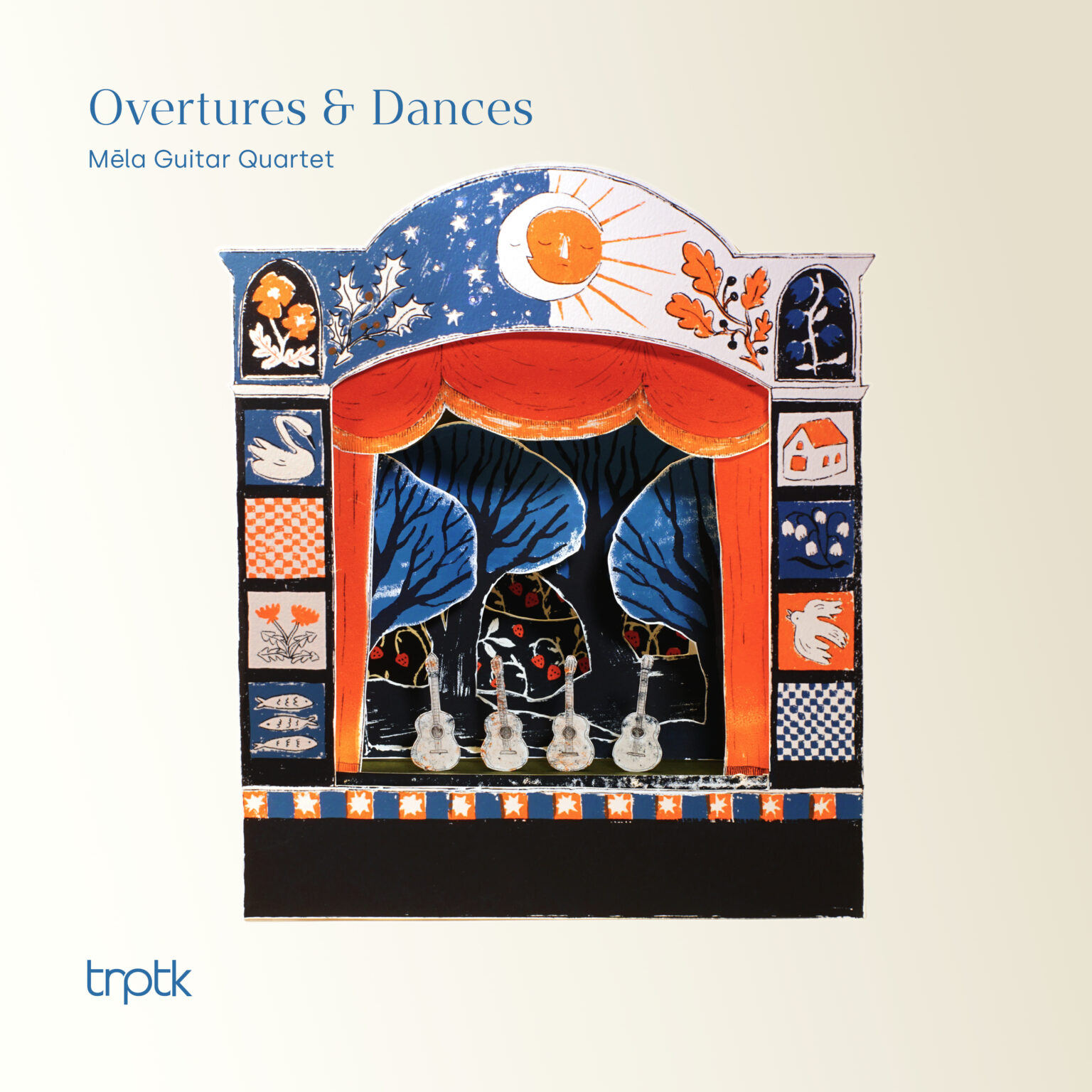 Mēla Guitar Quartet: Overtures and Dances (TRPTK)
Mēla Guitar Quartet: Overtures and Dances (TRPTK)
Good discs of transcriptions can make you think, temporarily at least, that you’re listening to a composer’s first thoughts. The Mēla Guitar Quartet’s Overtures and Dances gets it right: who wouldn’t want to hear the overture to Glinka’s Ruslan and Lyudmilla played by four guitars? This arrangement is both spectacular and sweet: Glinka’s fast scalic passages delivered with unshowy swagger, the players relaxing as one into the lyrical second subject. Brass fanfares and timpani strokes all survive their transmogrification – a triumph, in other words. Debussy’s Deux Arabesques are less outlandish source material, a two-handed piano line ingeniously divvied up between four guitarists to make a “rich, sustaining sonority”. Listen through decent speakers or headphones while looking at the booklet’s session photos and you can divine who’s playing what – that the playing is so superbly coordinated is remarkable. The Mēlas’ Ma mère l'Oye is based on Ravel’s five-movement piano-duet original. Every detail is audible, including the birdcalls in “Petit Poucet” and a growling, lumbering Beast, wittily depicted on a de-tuned low E string. Ravel’s “jardin féerique” glows, with some sumptuous closing chords.
There are some intriguing novelties here. Holst’s witty A Fugal Overture was new to me, the busy contrapuntal writing ideally clear, and these players catch the ebb and flow of Rachmaninov’s “Polka Italienne”. Other orchestral transcriptions include the “Bacchanale” from Saint-Saens’ Samson and Delilah and Elgar’s Three Characteristic Pieces, along with the overture to Humperdinck’s Hansel and Gretel. The arrangements, by past and present quartet members, invariably hit the mark, Daniel Bovey’s miniature suite based on Joe Hisaishi’s My Neighbour Totoro film score a delightful closer. TRPTK’s production values are high end, and the documentation is excellent.
- Read more classical reviews on theartsdesk















Add comment